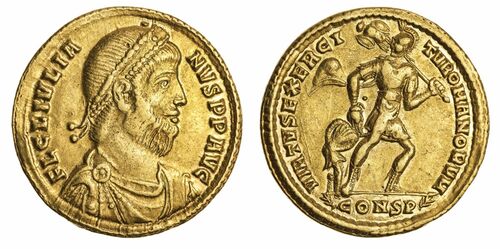
Auction: 23007 - Ancient Coins Including the 'Kyrios' Collection of Greek Coins and featuring the 'Ostorius' Collection of Roman Gold
Lot: 210
Roman Empire, Julian II, ' The Apostate' (AD 360-363), AV Solidus, Constantinople,
PROVENANCE
Purchased by a distinguished collector, Spink Numismatic Circular, June 1951, 45106 - 'very fine' - £15 [G14097/D8092]
Listed as from 'Black Pett VII', purchased by Spink en-bloc in 1950
Julian thought himself an ugly man. Writing in Antioch in early AD 363 shortly before his ill-fated war of aggression against the Sasanian Empire Julian reflects on his own appearance remarking: "I myself out of sheer perversity and ill-temper have added to it this long beard of mine, to punish it, as it would seem, for this very crime of not being handsome by nature. For the same reason I put up with the lice that scamper about in it as though it were a thicket for wild beasts". Julian, not only describes how his beard differentiates himself from his peers in this new beardless Christian age, but his beard is foul with its lice infestation.
Julian's seemingly bizarre self-mockery in the misopogon goes to the very heart of his self-positioning as an emperor seeking to establish himself as a pagan philosopher, a radically conservative positioning in a burgeoning Christian empire. Julian associated with philosophers throughout his life, studying Neoplatonism with Aedesius and later Maximus of Tyre - the later was even present for his final philosophical discussion as he lay fatally wounded after being speared at the Battle of Samarra. With his description of his own ugliness he implicitly compares himself to Socrates, who was notoriously ugly. The rather unpleasant description of the lice in his beard too serves to establish a philosophical pedigree indicative of the Cynic tradition with its focus on the repugnant body - the name Cynic even derives from the Greek for dog (cyon).
Julian's beard became a crucial marker of his identity as a philosopher, and crucially as a pagan. The prominence of his beard on coins crucially differentiates himself from his Constantinian predecessors, not just physically, but establishes him ideologically as something very different. The beard on his coinage is no mere casual choice, but part of an active effort to define himself as something very different to his predecessors.
The reverse type proclaims the virtus of the army - a fitting message from a surprisingly militarily successful emperor who achieved notable victories in Gaul as Caesar, most famously the battle of Strasbourg. This coin features an unusual die error with the final 's' of exercitus missing all together.
Subject to 20% VAT on Buyer’s Premium. For more information please view Terms and Conditions for Buyers.
Sold for
£2,600
Starting price
£1800




